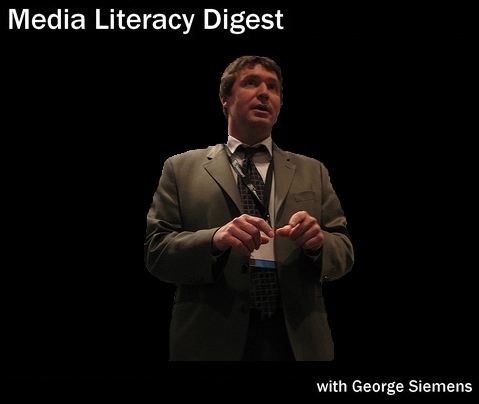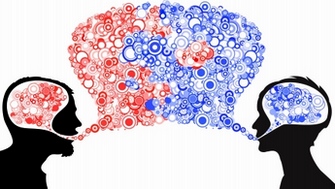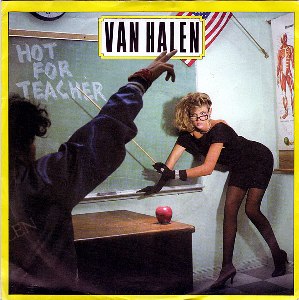Media Literacy Award - Deadline 15th July
The deadline for the Media Literacy Award is the 15th July.
Espacio de reflexión teórica y crítica de la Alfabetización mediática e hipermediática, así como de los conceptos de: educomunicación, recepción crítica, educación para los medios, educación con los medios, educación a través de los medios y educación en medios.
The deadline for the Media Literacy Award is the 15th July.
Publicadas por
Jorge Alberto Hidalgo Toledo
a la/s
11:53 a.m.
0
comentarios
![]()
Etiquetas: media literacy
# Posted by Garlin II : 4:34 PMPromoting Internet adoption, digital inclusion, and digital media literacy is essential making universal broadband access successful. We don't put drivers behind the wheel without training. Likewise, we shouldn't give away Internet access without providing the tools & training to take advantage of it in productive, responsible, beneficial and entertaining ways.
During this most recent tough legislative session, our state took a big step towards achieving this thanks to the passage of House Bill 1701 which authorizes the state Department of Information Services (DIS) to move us closer to universal broadband adoption. This victory for technological equality was made possible thanks to the leadership of Representative Bob Hasegawa and the tireless effort of advocates like Reclaim the Media Executive Director Jonathan Lawson.
Funded in part by Federal ARRA dollars, the law has 3 pillars:
The law goes into effect on July 1st, 2009.
Publicadas por
Jorge Alberto Hidalgo Toledo
a la/s
11:52 a.m.
0
comentarios
![]()
Etiquetas: digital media literacy
Inside this Media Literacy digest: Develop a critical attitude. Filter the media buzz. Learn to separate the news from the noise and make sense of the information that interests you. Here is George SiemensMedia Literacy digest: learning, networks, knowledge, technology, trends by George Siemens I’ve been in Italy for about a week - first a trip to Milan to present at theInternational Enterprise 2.0 conference organized by Open Knowledge. Videos of presentations are available on the official site (most are in English, even though titles are in Italian. I presented on Knowledge without Management). Useful case studies of emerging technology implementations were presented in the afternoon. After Milan, I went to Rome for a few days of sight seeing and generally consuming food. I found an interesting illustration of "old meets new" in Castel Sant’Angelo. An exhibit - Luminescenze 2009 (see images on Flickr) was held near the top floor. The use of QR codes, facebook, flickr, etc. offered a stark contrast to the need to physically “be there” to experience the ambiance of the castle. Each offers a value point - neither is fully complete without the other. Transformative changes in other information-based industries should capture the attention of educators. A few recent newspaper-related stories: I think you could replace newsroom references with classrooms... Discussions of language results in controversy that falls broadly into two camps: Chomsky, Pinker, and others occupy the innate camp and numerous others occupy a camp that can be described as social-interactionist, connectionist, and emergent. This debate will not be resolved any time soon. The idea of language adds an interesting perspective on speaking and toolmaking as similar / related activities: Toolmaking also requires hands capable of shaping tools, while speech requires a throat capable of vocalization.” Reading through the article, I was surprised how much the discussion on language shares with general discussions of learning… I’ve long enjoyed Chris Lott’s contribution to learning and technology. He brings his passion of poetry, philosophy, and technology into an informed world view. First time I met him face to face, we spent time arguing about Prensky (he challenged my notion that Prensky took edutech in the wrong direction. Chris argued that for a time, Prensky gave voice to a distinction that many were beginning to notice). Chris is a critic and an idealist (which is a positive). I just came across a presentation he delivered titled From Plato to Perl: the Problem of Sociality and the 'Idea'. He explores the mechanical predecessors of the digital age (fascinating to think about the many "near hits" in what eventually became the internet). A critical argument is advanced at about the 15:30 mark on how we are erroneously applying "mechanisms that we don’t understand", "retaining the least productive mechanisms" of scholarship and humanism and applying mechanical approaches to education. If you prefer text to video, similar ideas are expressed in this paper.Media literacy is the ability to analyze and evaluate the media to which we are exposed; it is a complex subject. Although most of us suffer from sensory over-stimulation from media, most do not have the time, or do not take the time, to analyze the consequences of this exposure. (Source: University of New Mexico)

Photo credit: Teemu Arina edited by Daniele BazzanoeLearning Resources and News
Old Meets New

That Failing Newspaper Industry...

“The stats show that total newspaper ad sales dropped by an unprecedented 28.28% in the first quarter of 2009, a deep plunge that represents a loss of more than $2.6 billion in ad revenue compared year-over-year.”
“But we’re hiding much of our newsrooms’ value behind a terribly anachronistic format: voiceless, incremental news stories that neither get much traffic nor make our sites compelling destinations. While the dispassionate, what-happened-yesterday, inverted-pyramid daily news story still has some marginal utility, it’s mostly a throwback at this point - a relic of a daily product delivered on paper to a geographically limited community.”
Tool Making and Language

“The ingredients of speaking and toolmaking are similar. Both require a brain capable of complex imitation and a community that wants to share information.
From Plato To Perl: The Problem of Sociality and The 'Idea'

Good use of stories and example throughout the talk (Babbage, Tennyson).
Originally written by George Siemens for elearnspace and first published on Jun 12th, 2009 in his newsletter eLearning Resources and News.
Publicadas por
Jorge Alberto Hidalgo Toledo
a la/s
11:51 a.m.
0
comentarios
![]()
Etiquetas: media literacy
For this post, I am going to be talking about a type of portrayal in the media - professionalism. I chose this topic because I am often frustrated by supposed professionals (particularily female professionals) who look like they should be in Van Halen's "Hot For Teacher" music video.
 http://dic.academic.ru/pictures/enwiki/72/Hot_for_Teacher.jpg
http://dic.academic.ru/pictures/enwiki/72/Hot_for_Teacher.jpg
It seems that professionalism is rarely represented as, well, professionalism. Many TV shows that are set in or feature professional settings lack the qualities of the professionalism that is expected of one in the real work place. For starters, lets look at professional attire. In a show that completely revolved around the events of a professional workplace, "Ally McBeal", little actual professionalism can be seen, particularly in the clothing. In the show, Ms. McBeal's office clothing staples were mini-skirts and décolletage bearing tops. In the real workplace, such attire is inappropriate as the professional workplace is not where one should be concerned with being "sexy" but where one is focused on work. This portrays the professional working world as a place where looking "sexy" is appropriate and important. This trend of "sexy" work-ware is something I have noticed in clothing stores. I have noticed mini-skirts being sold in the "career" sections of many stores geared towards young women. This demonstrates how big an impact TV can have on culture.
Another aspect of professionalism portrayed in TV shows are relationships within the professional setting. Many relationships in the professional real that appear in TV shows are portrayed as ones based on sexual attraction/desire. In a real workplace, relationships like this can be considered inappropriate. Take for instance the TV show "Friends". In season 6 one of the characters, Ross, is a professor at a local university. In episode 18, Ross brings in one of his teacher evaluations filled out by one of his students. The evaluation has numerous praises of his teaching and a mentioning of him as a "hot professor". As he discovers who this student is, he decides to go on a date with her when he realizes she will technically not be his student at the semester's end. Even though it seems okay, there is still a need for them to hide their relationship as they date. In the end, they get "caught," but never get in trouble. This shows that having unprofessional tendencies may not have consequences.
Lastly, I'd like to talk about representations of professional behavior on television. To do so, I will look at the prime time drama "House, MD". Any avid watcher of this shows knows of Hugh Lorie's character, House, and his drug use. Throughout the show he has continual need to take drugs. His boss and employees are well aware of his problem and do things to try to help him, but he never has "real" consequences such as loosing his job. He is threatened many times, but on he goes, treating patients while on drugs. Below you will see a montage of clips of House and his drug use:
Even though he has prescriptions for some of the drugs he takes, he is often confronted by coworkers on his drug dependence, but rarely shown real consequence. This again, like "Friends", and "Ally McBeal" gives a portrayal of there being no consequences to acting unprofessionally, ultimately skewing the idea of professionalism.
With these portrayals, it seems television often portrays professionalism in a way that is not actually professional. This gives a limited view of the professional world as there is little behavior or emphasis on appropriate professional dress, relationships, and behavior. A lot of professional representations on TV show mostly inappropriate professional behavior. These representations make it seem as if there is little value in being professional anymore. Things are becoming more and more casual in our culture, but professionalism is something that is imporant to keeping the workplace productive and focused.
Publicadas por
Jorge Alberto Hidalgo Toledo
a la/s
11:38 a.m.
0
comentarios
![]()
Etiquetas: media representations


|
Search this site
or
the web
powered by FreeFind |
|
|






My blog is worth $10,161.72.
How much is your blog worth?